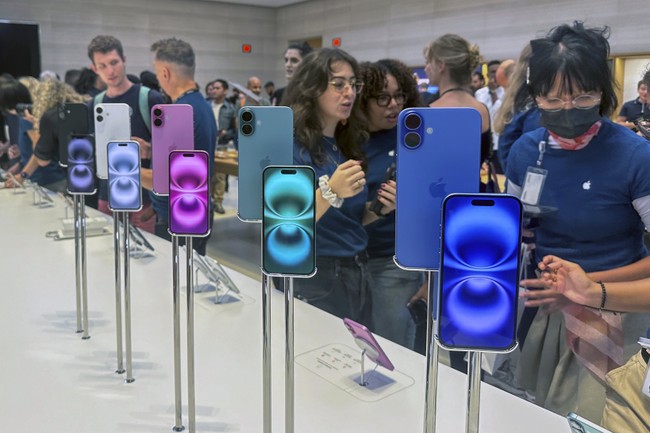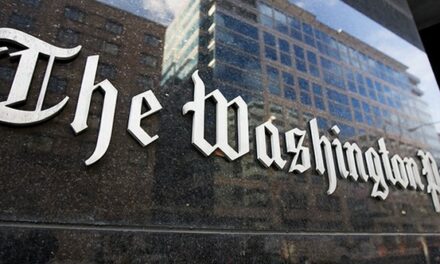We support our Publishers and Content Creators. You can view this story on their website by CLICKING HERE.

And a Happy New Year to the world’s coolest, wokest company!
China was so shiny and good to you.
New Apple Store in the Jing’an district in #Shanghai, China.
It cost over $11 million! pic.twitter.com/qdBmqftYcU
— S.L. Kanthan (@Kanthan2030) March 21, 2024
Advertisement
And then, like, it wasn’t.
GULP
Woah! $AAPL saw a 47% plunge in mainland China sales in November. And it’s NOT due to a bad economy as headlines will suggest.
China’s overall mobile phone market fell 5.1% to 29.6m units in November. That’s a decline of 1.59m units.
But foreign branded phones fell 47% to… https://t.co/uFF6hHoNqO
— Brian Tycangco 鄭彥渊 (@BrianTycangco) January 3, 2025
…But foreign branded phones fell 47% to 3.04m. They fell by 2.73m units!
The domestic brands alone registered a 19.1% YoY growth to 26,56m units.
Are the Chinese buying homegrown now? Has Apple lost its touch?
Chinese competitor Huawei is certainly turning into stiff competition for the American flagship brand, and how could it not when their phones are made ‘locally,’ chipsets and all?
The decline follows October’s 44.25% year-on-year drop in foreign smartphone shipments, extending a downward trend in the world’s largest smartphone market.
Apple, the dominant foreign smartphone maker in China, faces a slowing economy and competition from domestic rivals, such as Huawei.
Chinese consumer prices fell in November to their lowest in five months, as economic uncertainty and deflation concerns weigh on household spending.
…Apple briefly fell out of China’s top five smartphone vendors in the second quarter of 2024 before recovering in the third quarter. The U.S. company’s smartphone sales in China still slipped 0.3% during the third quarter from a year earlier, while Huawei’s sales rose 42%, according to research firm IDC.
Advertisement
It is true there are signs the Chinese economy is having a rough go at the moment, although what would be traditional auguries of an economic collapse in the West – especially the United States – don’t read the same in the Chinese economic behemoth. For instance, the Chinese yield curve on their ten-year bonds has plummeted to levels never seen before, according to analysts.
WOW.
China’s 10-Year Note Yield is now below 1.60% for the first time in history.
The yield is now down 100+ basis points in over the last year.
China and the US are moving in opposite directions. pic.twitter.com/Kk1tOMM4Qm
— The Kobeissi Letter (@KobeissiLetter) January 3, 2025
Where the divergence comes in is in the opinions about what that means.
Some analysts are in the “it’s all coming to a head’ corner.
Link: https://t.co/dBp0qJPyuF
— Scott Lincicome (@scottlincicome) January 1, 2025
Some believe ‘Japanification’ – saw that term many times today – is a possibility for China.
As China’s economy sputters, investors are asking whether the country could repeat Japan’s experience in the 1990s. Goldman Sachs Research finds that even though there are some key similarities between the two situations, China’s “Japanification” is far from certain.
While deteriorating demographics, a debt overhang, and an asset-bubble-burst were all important ingredients to Japan’s malaise at the turn of the century, a key contributor to its Japanification was a fundamental change in longer-term growth expectations, Goldman Sachs Research China Economist Hui Shan writes in the team’s report. She says growth expectations in China, which is also coping with worsening demographics, a debt overhang, and a deflating property market, are showing signs of a downward drift, but there are ways policymakers can avoid a Japanese-style slump.
Advertisement
Others think China’s just going to keep humming along.
China’s value-added industrial output grew 5.8% this year (Jan-Nov).
Chinese economy is doing pretty well, despite all the sanctions and daily hybrid war by the USA. pic.twitter.com/KOlwLARANk
— S.L. Kanthan (@Kanthan2030) December 16, 2024
Another theory is that China has been decreasing their US Treasuries (‘one of the main holders of US debt) – in fact, they’ve been selling them – purposefully/strategically in order to pump liquidity into their own market, in order to have leverage when Trump gets into office, and a trade war starts.
Yellen and the Treasury not having buyers forces the Treasury to pay more interest (higher bond yields) to finance our monstrous debt, leaving less money for the Trump administration to work with.
So Trump has the strong hand on the imports
And Xi Jinping now has the strong hand on the US debtWho has the strongest hand?
#12/25 pic.twitter.com/LeWS0wjqzc
— Compounding Girl (@CompoundinGirl) January 3, 2025
Besides ongoing Chinese economic challenges, Apple, whose phones make up 90% of the foreign cell phone sales in China, might also be a victim of its own share of the market.
There’s been a tit-for-tat tech war going on since September 2023, when TikTok came under fire. Essentially, soft banning Apple products from being used by state and government employees could be playing into some of the numbers. When you basically ban the most popular – and expensive – cell phone from being used at work in government offices (and only think of the numbers involved here), that’s going to leave a mark.
Advertisement
More Chinese agencies and state-backed companies across the country have asked their staff to not bring Apple (AAPL.O), opens new tab iPhones and other foreign devices to work, Bloomberg News reported on Friday, citing people familiar with the matter.For over a decade, China has been seeking to reduce reliance on foreign technologies, asking state-affiliated firms such as banks to switch to local software and promoting domestic semiconductor chip manufacturing.
Multiple state firms and government departments across at least eight provinces have instructed employees in the past month or two to start carrying local brands, the Bloomberg News report said.
Apple did not immediately respond to Reuters’ request for a comment.
In December, smaller firms and agencies in lower-tier cities from provinces including Zhejiang, Shandong, Liaoning and central Hebei, which houses the world’s largest iPhone factory, issued their own verbal directives, the Bloomberg News report said.
Sales of foreign phone brands in China plunged in November, according to official data released Friday, underscoring further pressure on Apple, the biggest international handset vendor in the country.
Read more here: https://t.co/IDvIIQpD4E pic.twitter.com/zCWDfsvkUg
— CNBC International (@CNBCi) January 3, 2025
It turns out there can be a lot going on behind a simple sales slump, isn’t there?
Advertisement
The things you learn.

 Conservative
Conservative  Search
Search Trending
Trending Current News
Current News 







